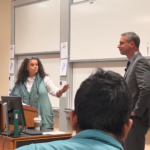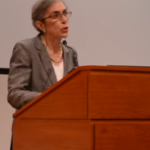Religion and Counseling Attacked
Grove City College psychologist Joseph Horton wrote the following column which was distributed by the Center for Vision & Values on August 25, 2010.
——————————————————————————-
By Dr. Joseph J. Horton
August 25, 2010
Does the state have the right to prevent people from training for particular careers because the state disagrees with their religious beliefs? U.S. District Judge George Steeh has made just such a ruling. Eastern Michigan University expelled Julea Ward from its master’s program in school counseling because Ms. Ward refused to undergo a reeducation program to silence her beliefs and to keep her convictions in check when counseling.
The flashpoint was Ms. Ward’s refusal to counsel homosexuals about relationships because such behaviors are not consistent with her religious beliefs. The dismissal of Ms. Ward’s lawsuit could have a chilling effect on religious freedom. The threat goes far beyond the issue of homosexuality. If the government can determine that some beliefs make a person unfit for a profession, then anyone who has an unpopular belief can be denied the opportunity to practice his or her own profession. After all, if the government can determine that personal beliefs can make a person ineligible to train for a particular profession, what is there to stop the government from forcing people out of their existing profession? This ruling is a threat to everyone’s freedom, no matter what one believes about homosexuality.
Judge Steeh ruled that Eastern Michigan had “a rational basis” for requiring students to counsel all possible clients. I will leave the constitutional law questions for the legal scholars. My concern is for the counseling profession and clients.
While I am neither a clinical psychologist, nor a counselor, I do have some graduate training in clinical psychology. I am confident that Judge Steeh’s ruling not only harms religious freedom, it will harm counseling and ultimately harm those who seek counseling. Proponents of the decision are attacking a belief system they find particularly odious, but they are also attacking the freedom of counselors to best meet people’s needs.
The issue is whether a given counselor should counsel any and every client. Historically, the answer to this question has been that counselors should not counsel every possible client. We all have biases. Sometimes a personal bias, religious or otherwise, would prevent a counselor from providing the high quality, neutral service that fully respects the client and the client’s right to self-determination. For example, I once heard a person who does marital therapy say that he did not counsel couples when the husband was physically abusive. This therapist believed that his strong negative feelings about abusive husbands would prevent him from counseling such couples well. The ethical approach for counselors in these situations is to refer clients to a therapist who will better meet their needs. To demand that counselors always be neutral regardless of their biases and convictions is to demand superhuman abilities.
Ironically, then, Ms. Ward was striving to treat homosexual clients with integrity and respect for their right of self-determination. Knowing that she would not be able to be supportive of homosexual behavior and relationships, she sought to allow homosexual clients to seek therapy from counselors who would be supportive. In my opinion, had Ms. Ward counseled homosexuals about relationships, this would have been unethical, her clients would not have received the neutral help they needed, and they may have been harmed.
The state has no business determining which biases are so unsavory that they must be changed through reeducation and which are benign. In the counseling room, any bias on the part of a counselor has the potential to harm certain clients. Counselors and therapists need the ability to refer clients to another professional when a personal bias could affect the clients’ treatment. Opponents of freedom of conscience may be able to use the power of the state to drive people with unpopular beliefs out of the counseling profession. However, the resulting profession will be less honest, less diverse, and less able to reduce human suffering.
Dr. Joseph J. Horton is an associate professor of psychology at Grove City College and a researcher on Positive Youth Development with The Center for Vision & Values.




